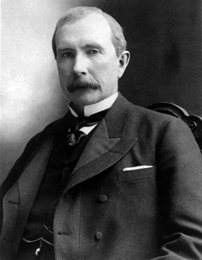|
John D. Rockefeller
Answer
to Name
This Famous Person Game - July 2014
by Mike McLeod
|
 |
Jerry Vach of Atlanta, Ga., and Ted Carlton of Utah correctly identified John D. Rockefeller.
In 2007, Peter W. Bernstein and Annalyn Swan published All the Money in the World, a book about the wealthiest Americans who have ever lived. Bill Gates and Warren Buffet, who are numbers 1 and 2 on Forbes’ 2014 list of wealthiest Americans, only ranked 13 and 15 respectively in the book. Gates is the richest person in the world today with $78 billion, but his wealth is just a fraction of what John D. Rockefeller amassed, when converted to today’s dollars.
|

|
The list below is from All the Money in the World and reflects amounts in 2006
dollars:
|
1. |
John D. Rockefeller
|
$305.3 billion
|
|
2.
|
Andrew Carnegie
|
$281.2 billion
|
|
3.
|
Cornelius Vanderbilt
|
$168.4 billion
|
|
4.
|
John Jacob Astor
|
$110.1 billion
|
|
5.
|
Stephen Girard
|
$95.6 billion
|
|
6.
|
Richard Mellon
|
$82.3 billion
|
|
7.
|
A.T. Stewart
|
$80 billion
|
|
8.
|
Frederick Weyerhauser
|
$72.2 billion
|
|
9.
|
Marshall Field
|
$68.1 billion
|
|
10.
|
Sam Walton
|
$58.6 billion
|
|
11.
|
Jay Gould
|
$58.2 billion
|
|
12.
|
Henry Ford
|
$54.3 billion
|
|
13.
|
Bill Gates
|
$53 billion
|
|
14.
|
Andrew Mellon
|
$50.5 billion
|
|
15.
|
Warren Buffett
|
$46 billion
|
John D. Rockefeller was born on July 8, 1839 to William Rockefeller and Eliza Davison in Richford, N.Y. William liked the freedom of the road, and he often left Eliza to tend to their children alone. He eventually left them permanently.
Despite his father’s poor example, John was taught good work ethics by his mother. He grew up to be a religious man, never drinking or smoking, but always tithing his income.
With a head for numbers and brief business school training, John’s first job was as an assistant bookkeeper making 50 cents a day for a company that shipped produce and acted as a middle man in sales.1 After a few years, he and a partner started a competing business in the same field, and it prospered.
“Don't be afraid to give up the good to go for the great.”
A defining moment came when Rockefeller and partners built an oil refinery in Cleveland, Ohio, in 1863. With the price of whale oil rising dramatically, kerosene made from oil was found as a better alternative. Through the hard work and determination of John D. Rockefeller and his partners, this first refinery grew into the oil refining and distribution empire known as Standard Oil.
Rockefeller has been described as ruthless when it came to competition, and he was vilified in the media for his business practices. He often offered to buy competing oil companies, but if they refused, he undercut prices and drove them out of business. By the late 1880s, he controlled most of the oil production, distribution and sales in the United States. (This was before the invention of the automobile, of course, and before gas stations dotted the landscape.)
Pres. Teddy Roosevelt spearheaded an effort to pass laws to break up monopolies, which is what happened to Standard Oil. This created most of today’s many oil companies. Ironically, this breakup caused Rockefeller’s net worth to jump by millions of dollars because he received stock in all of those companies.
After Rockefeller retired in 1896, he focused on philanthropy. His donations helped create, support or elevate the University of Chicago, Spellman College in Atlanta (named after his wife Laura Spelman and her abolitionist parents), the Central Philippine University in the Philippines, the Rockefeller University for biomedical research (established in 1910), and Baptist colleges. The Rockefeller Foundation has promoted education, science, food production, art and health throughout the world.
Rockefeller’s philanthropy continued with his son John, Jr., who “…purchased land and donated money…to create or expand Acadia, Great Smoky Mountains, Grand Teton, Yosemite and Shenandoah National Parks.”2 John, Jr., was also the major sponsor of the restoration and reconstruction of Colonial Williamsburg.
John D. Rockefeller died of arteriosclerosis at the age of 97 on May 23, 1937.
“I believe it is a religious duty to get all the money you can, fairly and honestly; to keep all you can, and to give away all you can.”
------------------------------------
1 Fee.org.
2 Pbs.org.
Quotations are courtesy of Brainyquote.com and Wikiquote.
Learn
about more Famous People
|